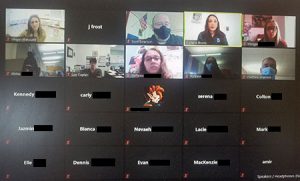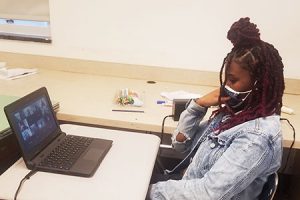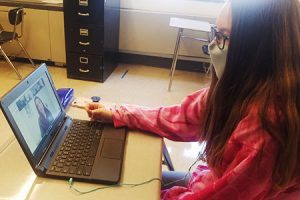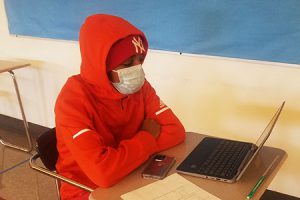 News 10 reporter Giuliana Bruno dished on her career as a broadcast journalist during a recent virtual visit with Watervliet High School students.
News 10 reporter Giuliana Bruno dished on her career as a broadcast journalist during a recent virtual visit with Watervliet High School students.
The Capital Region native joined seniors from Megan Matusek’s Business Communications and CEIP classes and 10th graders from Scott Emerson’s Global Studies class to share her experiences that led to her current position as a reporter for WTEN in Albany, her hometown.
 Ms. Bruno told students about her early foray into journalism as the founder of her high school newspaper. After graduating, she went on to pursue a degree in journalism and TV production at Emerson College in Boston, where she admitted to being “obsessed” with the campus TV station. “I was working with a different show every night, which also consumed my weekends,” Ms. Bruno said. “I think all of that played into where I am now.”
Ms. Bruno told students about her early foray into journalism as the founder of her high school newspaper. After graduating, she went on to pursue a degree in journalism and TV production at Emerson College in Boston, where she admitted to being “obsessed” with the campus TV station. “I was working with a different show every night, which also consumed my weekends,” Ms. Bruno said. “I think all of that played into where I am now.”
She encouraged students to be fearless when applying to colleges and to not discount their dream schools.
“Emerson was my top choice,” she said, “but I remember my counselor called it a ‘reach’ school and recommended that I look at more realistic options.” Ms. Bruno explained further that while she understands the reasoning behind her counselor’s advice, she applied only to the schools on her “reach” list. “College applications cost money, so it is helpful to have back-up options,” she said, “however, I learned that you can be safe, but also be ambitious and have it pay off.”
 Students had opportunities to ask questions throughout the presentation.
Students had opportunities to ask questions throughout the presentation.
One student wanted to know about the types of news that tend to impact reporters the most.
“Any news reports that involve children being put in harm’s way are the hardest emotionally,” said Ms. Bruno. She described that when reporters arrive on a scene, typically the community is experiencing a tragic event that is fresh for all involved. “Most times, they are not happy to see a camera crew in their neighborhood when they are going through quite possibly the worst day of their life,” she said. “You have to have a thick skin for those types of stories, but also have empathy to report it in a way that shows you are human. At the same time, you have to focus on the facts. It’s a balance. You’re a reporter, but you’re also hum an.”
an.”
Another student was curious about the ways COVID has changed her job experience.
“I do a lot of interviews over Zoom now,” Ms. Bruno replied. “I miss being out in the community, and going to events. Even though it has started to return to normal a little bit, we still have to wear masks during interviews, and wear masks for hours at a time every day in the car with our news photographers driving to events or in between live shots. It gets tough, but we have to do it.”
She also explained how capacity in the newsroom and on the set has been reduced since the pandemic began. “The (news) anchors have just started to sit at the desk together again,” she said. “For the majority of the past year, they were standing on opposite sides of the studio. We had to change how we do things because the news keeps happening, we couldn’t take a break.”
Students also sought tips from the reporter on building confidence when speaking in public or during college or job interviews.
Ms. Bruno expressed that we all have insecurities, but it is important to “flex what you’ve got” and not to focus on what you don’t have.
“I didn’t have perfect grades, but I got into every college I applied to ‒ Syracuse, Fordham, Emerson ‒ because I did basketball, volleyball, the newspaper. I put all these activities on my application, which made me seem like an outgoing, confident human being, and ultimately got me to where I am,” she said. “So these things about yourself that you think might not be that important – all of it can make you sound like the most impressive person that this college admissions director has ever met.”
When asked her advice about overcoming failure or disappointment, Ms. Bruno offered this: “Own your mistakes, correct them and move on,” she said. “You will live to see another day. I feel like every day at my job I have an opportunity to redeem myself, and hopefully make people forget about any previous mistake.”


